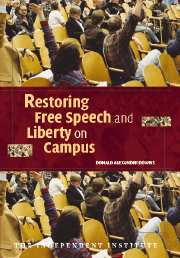8 - Civil Liberty and Political Strategy on Campus
Published online by Cambridge University Press: 12 July 2009
Summary
The preceding chapters raise several general and specific points that can contribute to our understanding of the relationship between political mobilization and the status of civil liberty in the university. Let us begin with the nature of adjudication. Although debate rages about how much due process students and faculty are entitled to under the Constitution or through accepted ethical norms, many of the cases discussed highlight the critical need to ensure separation of the prosecution and adjudication functions. This point emerges most poignantly from the chapters dealing with the sexual misconduct policy at Columbia and the water buffalo case at Penn. Such separation is an underlying principle of the right to a fair trial and should apply to all universities. The Penn case also reveals how even the narrowest of codes (in that case an “intent” code) can be abused if the requirement of fundamental fairness is ignored.
Pragmatism and Absolutism
In addition, the case studies here allow us to examine another point that is seldom addressed: the distinction between cases worth fighting for and those that merit a less adversarial approach. William Gormley writes in his book on administrative reform that most social and political problems call for “prayers” rather than “muscles” because problems are often complex, and reform can inadvertently make things worse. In a complex world, the spirit of compromise is often a virtue.
- Type
- Chapter
- Information
- Restoring Free Speech and Liberty on Campus , pp. 261 - 274Publisher: Cambridge University PressPrint publication year: 2004



